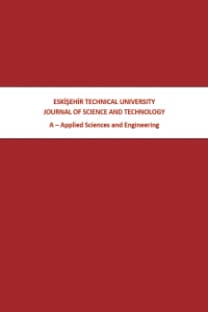(3,3,4,4,5,5,6,6,7,7,8,8,9,9,10,10,10-HEPTADEKAFLORODESİLL) (METİL) SULFAN SÜBSTİTÜE TİTANYUM FTALOSİYANİN TÜREVLERİNİN SENTEZİ VE KARAKTERİZASYONU
Ftalosiyanin, Ftalonitril, MALDI-TOFF
SYNTHESIS AND CHARACTERIZATION OF SOME (3,3,4,4,5,5,6,6,7,7,8,8,9,9,10,10,10-HEPTADECAFLUORODECYL) (METHYL) SULFANE SUBSTITUTED TITANIUM PHTHALOCYANINE DERIVATIVES
Phthalocyanines; Phthalonitrile; MALDI-TOF,
___
- Arslanoglu, Y., Sevim, A.M., Hamuryudan, E., Gul, A., (2006). Near-IR Absorbing Phthalocyanines, Dyes and Pigments, 68, 129-132.
- Bıyıkoğlu, Z., (2013). Water-soluble Axially Disubstituted Non-aggregated Silicon Phthalocyanines and Their Electrochemical Properties. Dyes and Pigments, 99, 59–66.
- Wilfred L.F. Armarego and Christina Li Lin
- Ceyhan, T., Altındal, A., Erbil, M. K., Bekaroğlu, Ö., (2006). Synthesis, Characterization, Conduction and Gas Sensing Properties of Novel Multinuclear Metallo Phthalocyanines (Zn, Co) With Alkylthio Substituents. Polyhedron, 25, ,737–746.
- Yılmaz, Ö., (2006), Yeni Tip Okso- Titanyum
- Gullotti, M., Pasini, A., (1975). Schiff Base Complexes of Oxocatiohs. Part III*. Oxotitanium(IV) Complexes with Tetradentate Optically Active Schiff Bases. Inorganica Chimica Acta, 15, 129- 136.
- Jin, L., Chen, D., (2012). Enhancement in Photovoltaic Performance of Phthalocyanine-sensitized Solar cells by Attapulgite Nanoparticles. Electrochimica Acta, 72, 40–45.
- Kobayashi, S., (2002). Dimers, Trimers and Oligomers of Phthalocyanines and Related Compounds, Coordination Chemistry Reviews, 227, 129-152.
- Lokesh,K. S., Adriaens, A., (2013). Synthesis and Characterization of Tetra-Substituted Palladium Phthalocyanine Complexes. Dyes and Pigments, 96, 1, 269-277.
- Moussaron, A., Arnoux, P., Vanderesse, R., Sibille, E., (2013). Lipophilic Phthalocyanines for Their Potential Interest in Photodynamic Therapy: Synthesis and photo-physical properties. Tetrahedron, 69, 47, 10116–10122.
- Shumov,Y. S., Heyrovský, M., (1975). The Relation Between Catalytic and Photoelectro-chemical Properties of Phthalocyanine Films. Journal of Electroanalytical Chemistry and Interfacial Electrochemistry, 65, 1, 469– 471.
- Simon, J.; Andre, J.J. (1985). Molecular semiconductors; Chapter 3, 73-149, Springer; Berlin. Chai, (2009), Purification of Laboratory Chemicals (Sixth Edition), ISBN: 978-1- 85617-567-8, Elsevier Inc., Oxford OX2 8DP, UK). (IV) Ftalosiyaninlerin Sentezi ve Karakterizasyonu, Yüksek Lisans Tezi, T.C. Gebze Yüksek Teknoloji Enstitüsü Mühendislik ve Fen Bilimleri Enstitüsü.
- Zakharov, A.V., Girichev, G. V., (2008). Theoretical Study of The Structure, Vibrational Spectra, and Electronic Spectra of Oxotitanium Porphyrin, Octamethylporphyrin, Porphyrazine, and Phthalocyanine Complexes. Journal of Molecular Structure: THEOCHEM, Volume 851, 1–3,183-196.
- Zugle, R., Nyokong, T., (2013). Zinc(II) 2,9,16,23-Tetrakis[4-(N-Methylpyridyloxy)]- Phthalocyanine Anchored on An Electrospun Polysulfone Polymer Fiber: Application for Photosensitized Conversion of Methyl Orange. Journal of Molecular Catalysis A: Chemical, 366, 247-253.
- ISSN: 2667-4211
- Yayın Aralığı: Yılda 4 Sayı
- Başlangıç: 2000
- Yayıncı: Eskişehir Teknik Üniversitesi
FİNANSAL RİSKLERİN UÇ DEĞER KURAMI İLE ÖLÇÜLMESİ
Ayse ARIK, Basak BULUT, Meral SUCU
ALTERNATİF ROTALI HÜCRE OLUŞTURMA PROBLEMLERİNİN ÇÖZÜMÜ İÇİN YENİ BİR MELEZ YAKLAŞIM
ULTRASOUNDLA E.COLI DEZENFEKSİYONUNA ORTAM İYONLARININ ETKİSİNİN İNCELENMESİ
EN YAKIN KOMŞU SEZGİSELİ YAKLAŞIMI İLE MARKET TABANLI GÖREV DAĞITIMI
Uğur GÜREL, Osman PARLAKTUNA, Nihat ADAR, Selçuk CANBEK
KİRİŞ-KOLON BİRLEŞİM BÖLGESİNİN CFRP RULOLARLA DEPREME KARŞI GÜÇLENDİRİLMESİ
